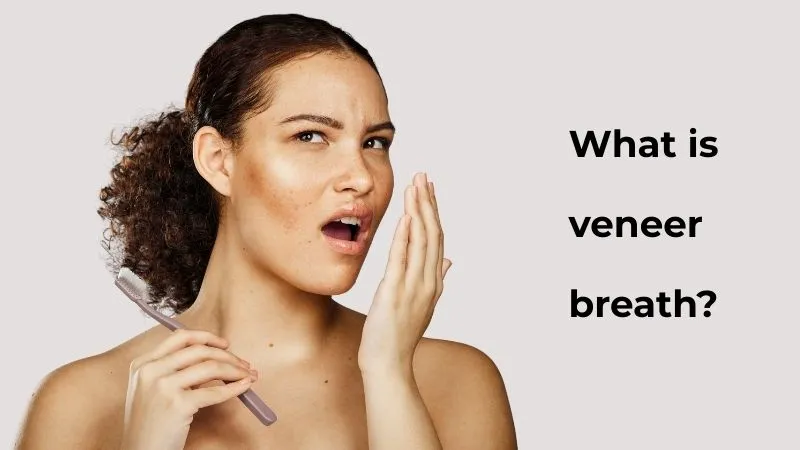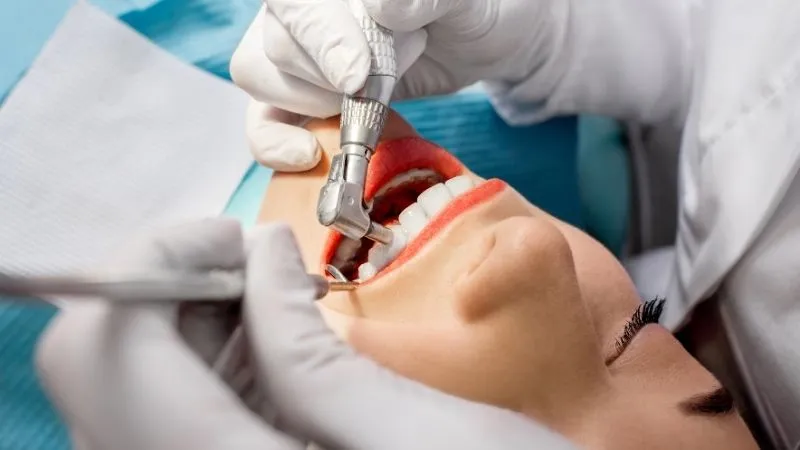What is veneer breath and How to get rid of it?
Dental veneers are a popular cosmetic solution that can enhance your smile, although some people may suffer from 'veneer breath',a form of halitosis. Although it can be easily controlled with the right information and attention, the sensation can undermine your confidence. This article provides a scientific yet humane definition of badbreath – itscauses, how to get rid of it, and how to avoid it.

What is veneer breath?
Dental veneer breath is the name given to the bad breath (halitosis) that follows the application of dental veneers. Dental veneers are thin, custom-made porcelain or composite shells that are bonded to the front surface of teeth to improve their appearance. Veneers themselves do not have an odour, but poor oral hygiene or improper veneer placement can lead to bacterial buildup and plaque, which can cause this problem. This can be avoided and treated with proper care and professional help.
Why do veneers smell bad?
There are many different reasons for veneer breath. The first step in solving the problem is to understand these factors.
Poor oral hygiene
Dry mouth (xerostomia) is another cause of bad breath with veneers. Saliva is a natural preservative that cleanses the mouth and balances bacterial acid production. A dry mouth promotes bacterial growth and causes bad breath. Dry mouth can be caused by medication, dehydration, mouth breathing, or certain medical problems. Drinking plenty of water and chewing sugarless gum will help produce more saliva.
Dry mouth
Dry mouth (xerostomia) is another factor that can contribute to bad breath with veneers. As a natural preservative, saliva cleanses the mouth and balances bacterial acid production. A dry mouth promotes bacterial growth and causes bad breath. Dry mouth can be caused by medication, dehydration, mouth breathing, or certain medical problems. Drinking plenty of water and chewing sugarless gum will help produce more saliva.
Tonsil stones
Small, hard deposits called tonsil stones (tonsilloliths) form in the crevices of the tonsils. They are made up of bacteria, food particles, and mucus and can cause a bad odor. Although not directly related to veneers, tonsilloliths can contribute to veneer breath. Gargling with salt water and regular oral hygiene will help to reduce the formation of these stones.
Unsuitable veneers
Sloppy or poorly made veneers are a major cause of veneer breath. If there are gaps between the veneer and the natural tooth, food particles and bacteria can accumulate in these areas. This leads to plaque build-up, gum irritation, and unpleasant odour. Properly applied by a qualified dentist, veneers reduce this risk. Regular checkups help to monitor the condition of the veneers.
How to prevent veneer breath?

Preventing veneer breath is easier than treating it. These techniques will enable you to maintain your odour-free veneers:
Regular brushing, flossing, and mouthwash stop germs from growing.
Collaborate with an experienced dentist to guarantee appropriate use of your veneers.
Have your veneers examined by your dentist every six months to have them professionally cleaned.
Drinking water throughout the day will help you to avoid dry mouth.
Avoid food with smells. Cut back on onion and garlic among strong-smelling foods.
Quit smoking. Smoking causes unpleasant odour and discolouration on your veneers.
|
Cause |
Explanation |
Solution/Prevention |
|
Insufficient Oral Hygiene |
Food debris and plaque buildup cause bacteria to multiply, producing sulfur compounds that smell. |
Brush twice daily with fluoride toothpaste, floss daily, and use antibacterial mouthwash. |
|
Dry Mouth |
Lack of saliva allows bacteria to thrive, increasing odor. Caused by dehydration, medications, or mouth breathing. |
Drink plenty of water, chew sugar-free gum, and use saliva-stimulating products. |
|
Tonsil Stones |
Small, calcified deposits in the tonsils trap bacteria, emitting a foul odor. |
Gargle with salt water, maintain good oral hygiene, and consult an ENT specialist if persistent. |
|
Unsuitable Veneers |
Gaps or poor fit in veneers create spaces where bacteria accumulate, leading to decay and odor. |
Work with an experienced dentist and schedule regular checkups to ensure proper fit. |
How to get rid of veneer breath?
Depending on the source, veneer breath might have various smells. Usually, bacteria create volatile sulphur compounds that emit a sulphurous smell evocative of rotten eggs. It should there be decay, there might be a metallic taste; should food remnants have built up, there might be a stale smell. In social settings, this offensive smell might create discomfort and lower self-esteem. Knowing the kind of smell will help one to know the source.
As a dentist who loves crafting perfect smiles with veneers, I know veneer breath can be a frustrating issue. My patients often ask how to keep their breath fresh, and I’ve got a straightforward plan that works. First, I stress the importance of a solid oral hygiene routine tailored for veneers. Use a soft toothbrush with gentle, fluoride toothpaste twice daily, and pair it with daily flossing or a water flosser to clean those hard-to-reach spots near the gumline. I also recommend a quick rinse with an alcohol-free mouthwash to zap bacteria without drying out your mouth. Staying hydrated is another must—sipping water all day washes away food bits and keeps saliva flowing to fight odournaturally.
Another trick I share is tackling the tongue and diet. I urge my patients to scrape their tongue every morning with a simple tongue scraper—it’s an easy way to remove bacteria that can make breath stale. Watching what you eat helps, too; steer clear of heavy garlic or sugary snacks that linger. Instead, munch on crisp apples or celery to naturally scrub your teeth. Regular check-ups in my office are key to catching any veneer issues early, and I always make sure my patients leave with a polished, fresh smile. With these steps, I’ve helped countless folks keep veneer breath gone for good!
Why do I have a bad taste in my mouth after veneers?
Bad taste in the mouth after veneers is usually brought on by the same factors as veneer breath. Bacteria, tooth decay, or gum disease can accumulate around the veneers, causing an unpleasant taste. Improper veneers can trap food particles, which will produce this flavour. Improving oral hygiene and seeing a dentist will help to clarify things.
Safely veneers with experienced dentists of Rengarenk Dental Clinic
Our knowledgeable and qualified dentists provide top-notch veneer treatments at Rengarenk Dental Clinic. Proper application and maintenance help to prevent issues like veneer breath, which we therefore value. Using modern technology and premium materials, our clinic ensures the perfect placement of your veneers. Regular check-ups and individualised treatment strategies enable us to make sure your veneers remain both appealing and healthy.
Choosing Rengarenk Dental Clinic allows you to smile confidently, free from concern about veneer breath.
F.A.Q:
Why do my veneers smell bad, or were they done wrong?
No panic, veneers don't stink! However, if the edges of the veneers do not fit snugly against the teeth or if the adhesive residues are not cleaned, bacteria accumulate in these areas. And of course, if we forget to brush our teeth, things get complicated. The solution is simple: regular cleaning and working with a good dentist. If there is still an odour, visit your dentist; a little touch and everything will be solved
What should I do to get rid of veneer breath? Is there a magic formula?
You have the magic! Brush your teeth twice a day, especially giving love to the edges of the veneers. Clean in between with dental floss or an interdental brush; please keep in mind your tongue! An alcohol-free mouthwash and drinking plenty of water also refresh your breath. Oh, and if you make regular visits to the dentist, this odour will not bother you
I have a strange taste in my mouth after the veneers are fitted; is it normal?
A slight change in taste after veneers may be due to adhesive residue or sensitivity of the gums. It usually goes away in a few days. Everything will be fine with a quick check; don't worry!
Are veneers safe, and how long do they last?
Veneers are the superheroes of dentistry! Porcelain veneers are both safe and biologically compatible. If you take good care, they will stay with you for 10 to to15 years. The only condition: if you grind your teeth or are lazy with cleaning, be a little careful. If you work with a competent dentist, your smile will shine for years

